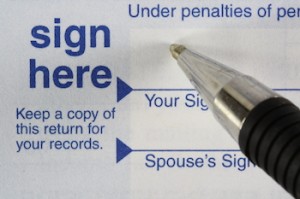Wheaton Office |
St. Charles Office |
Sycamore Office
 630-665-7300
630-665-7300
Divorce and Taxes
 Regardless of when you file for divorce, your tax status—whether you can file jointly with your spouse or must file individually—depends on your marital status as of the last day of the year (December 31). For example, if you have filed for divorce but are still legally married on December 31, you can file a joint return with your spouse for that year; if, however, you have officially divorced as of December 31, you can no longer file jointly for that year. Wherever you are in the separation process, there are a few things to keep in mind to relative to filing your taxes.
Regardless of when you file for divorce, your tax status—whether you can file jointly with your spouse or must file individually—depends on your marital status as of the last day of the year (December 31). For example, if you have filed for divorce but are still legally married on December 31, you can file a joint return with your spouse for that year; if, however, you have officially divorced as of December 31, you can no longer file jointly for that year. Wherever you are in the separation process, there are a few things to keep in mind to relative to filing your taxes.
Filing Jointly
Filing returns jointly usually provides a benefit to spouses, as it usually leads to a lower tax liability. For this reason, spouses often file jointly (even if they are going through the divorce process). However, according to the Internal Revenue Service, both spouses are jointly and individually responsible for taxes, penalties, and interest due on any joint tax return filed for a year that ended before your divorce. This rule applies even if a divorce agreement states that a former spouse is responsible for these amounts (in other words, the IRS is not bound by an agreement entered in a family court). However, a spouse may be able to file for relief from IRS liability. There are three types of relief:
- Separation of liability in cases where joint filers are divorced or legally separated or who have not lived together for 12 months
- Equitable relief
- Innocent spouse relief
It is important to discuss all of these possibilities with an experienced family law attorney and tax professional in order to understand and implement the best option for you, if you need relief from tax liability.
Filing Separately
Because filing separately usually leads to increased tax liability, it is important, while going through the divorce process, to carefully discuss the issues of tax liability, deductions, and exemptions with your family law attorney and tax professional in order to maximize your return after a divorce. Because of the way Illinois classifies property settlements in divorce, when you file a separate tax return from your spouse or former spouse, you may be allowed to claim certain itemized deductions—whether you paid these expenses separately or jointly with your spouse. These deductions can apply to:
- Medical expenses
- State income tax
- Property tax
- Mortgage interest
- Casualty loss
It is important to remember that if you choose to or are required to file a separate return, you will likely end up paying a higher tax than you would when filing a joint return. This is due to a number of special rules that apply when you choose to file separately. If, however you chose to file separately from your spouse but were eligible to file a joint return, and you then later change your mind and want to have that return filed jointly, you have up to three years to file a form 1040X to change the filing status of your return.
Divorce law and tax law are some of the most complicated laws to navigate. If you are considering filing for divorce, your first step should be to contact the experienced family law attorneys at MKFM Law.


 Read More
Read More





